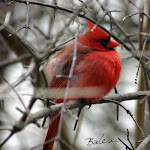And speaking of woolly worms, when last we met, there's a large group of moth caterpillars collectively known as woolly worms or, as I prefer, woolly bears, that grow up to be rather spectacular moths; some even make long-range weather predictions.
Gretchen Kirkland sent me this photo of a giant—for obvious reasons—leopard moth (Hypercompe scribonia), found in her backyard. This striking creature had spent its wayward days of youth trundling about as a woolly bear caterpillar.
 |
| Wiki media |
Getting from point A to point B—caterpillar to moth—is nothing less than miraculous, when somewhere in between it breaks down its corporeal form into a Lepidopteran goo and rearranges itself, yet it happens everyday en plein air.
As a caterpillar they eat dandelions, broadleaf plantains and violets, as an adult there's no need for such.
Thank you, Gretchen.
•



































































1 comment:
Pretty cool. There was something like this in TX that would fall out of the trees and sting your neck if they fell on you. I wonder if most bristly caterpillars sting like that.
Post a Comment